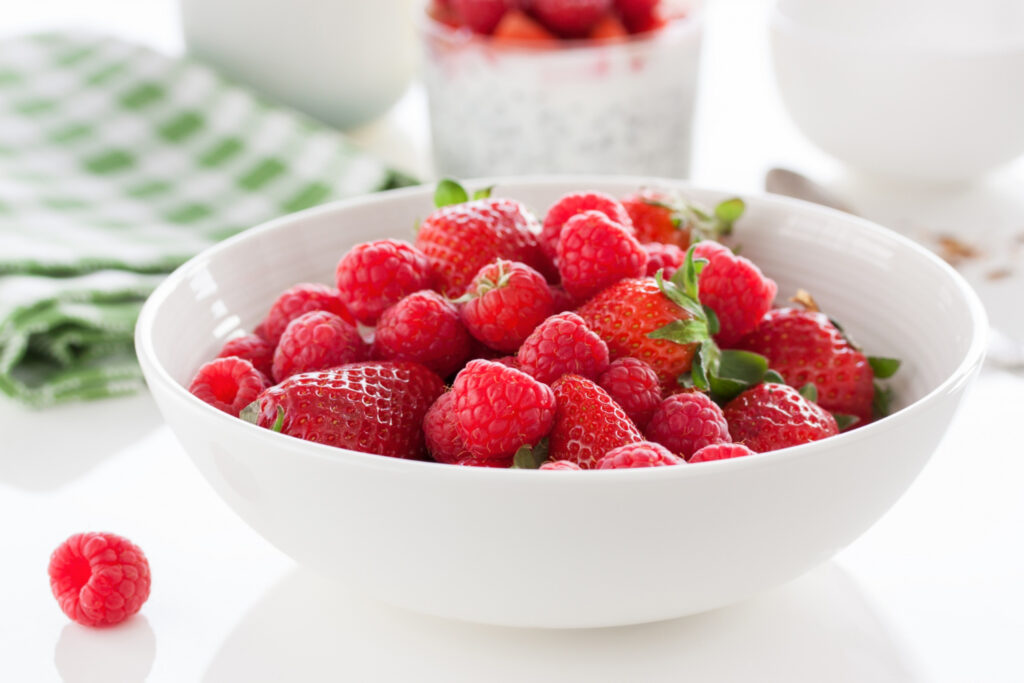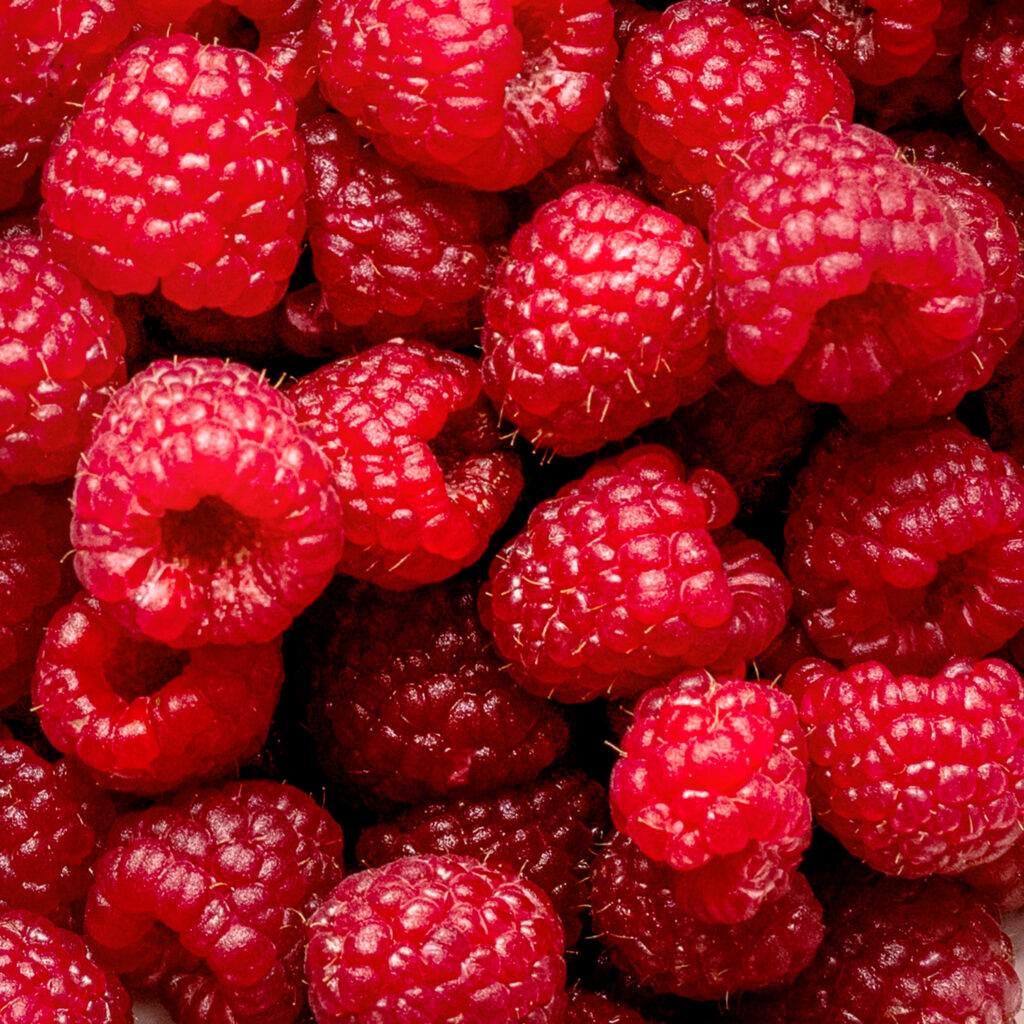
Fast Facts
Raspberries contain less than 2.7 grams of sugar per 100-gram serving
They are rich in antioxidants like vitamin C, which help fight oxidative stress
A 100-gram serving of raspberries provides 6.5 grams of fiber.
Raspberries are enjoyable all year long, not just for their bright color and delicious taste but also for their impressive nutritional profile, making them one of the healthiest choices in the produce aisle. These versatile fruits are rich in nutrients and antioxidants, low in sugar, and offer numerous health benefits, including boosting cognitive health and protecting against chronic diseases.
Low in Sugar
Raspberries are one of the lowest-sugar fruits, containing less than 2.7 grams of sugar per 100-gram serving (about 3/4 cup). For comparison, a small apple contains about 17 grams of sugar. This low sugar content makes raspberries an excellent option for those who want to enjoy a sweet treat while minimizing their sugar intake.
Rich in Anti-Aging Antioxidants
Raspberries are packed with antioxidants, especially vitamin C. Higher intakes of antioxidant-rich fruits like raspberries are linked to a lower risk of chronic diseases, such as cardiovascular disease and cancer. Antioxidants help delay or prevent cell damage caused by free radicals, which are unstable molecules produced during exercise, food conversion into energy, and exposure to environmental factors like cigarette smoke, air pollution, and sunlight. Excessive free radicals can lead to oxidative stress, causing cell damage, but antioxidants can counteract this stress. Additionally, antioxidants reduce inflammation, which is associated with premature aging, and may also alleviate arthritis pain.
Potential Cancer Protection
The antioxidants and anti-inflammatory compounds in raspberries may help protect against cancer. Some studies suggest that these compounds can reduce the reproduction of cancer cells. Raspberries contain ellagitannins and anthocyanins, which are phytochemicals with potential cancer-fighting properties.
High in Fiber
Raspberries are an excellent source of fiber, offering 6.5 grams per 100 grams (about 3/4 cup). Fiber contributes to fullness, helps control blood sugar levels, and supports good digestive health. The fiber in raspberries also promotes the growth of beneficial gut bacteria, which can positively affect people with obesity, metabolic syndrome, and other chronic gut diseases.
May Help Prevent Diabetes
A study involving 32 adults aged 20 to 60 years compared three breakfast meals with different portions of frozen red raspberries: one meal had no raspberries, the second included one cup, and the third provided two cups. Researchers found that for those at risk of diabetes, consuming more raspberries could lower blood sugar levels and reduce the insulin needed to manage blood sugar.
Enhances Brain and Memory Function
Raspberries help counter oxidative stress, an imbalance between free radicals and the body’s ability to fight them. Oxidative stress is a risk factor for diseases like Alzheimer’s and Parkinson’s. Raspberries, rich in flavonoids, have been shown to improve coordination and memory, making them a top brain-supporting food.
Nutritional Profile of Raspberries
One cup (123 grams) of raspberries contains:
- Calories: 51–57 kcal
- Fiber: 6.5 grams
- Vitamin C: 23 milligrams
- Manganese: 0.494 milligrams
This amount of vitamin C is approximately 43% of the daily recommended intake for females and 36% for males who don’t smoke. Vitamin C supports immunity, skin health, and collagen production. Raspberries also provide manganese, calcium, vitamin K (important for bone health), vitamin E, B vitamins, magnesium, copper, iron, and potassium.
Risks of Raspberries

While generally healthy, some individuals may be allergic to raspberries. Additionally, fruits can be contaminated with bacteria causing food poisoning, which includes symptoms like stomach pain, diarrhea, vomiting, and fever. To minimize this risk, rinse raspberries under running water, remove any damaged areas, and dry them with a clean paper towel before eating.
Tips for Consuming Raspberries
Raspberries can enhance numerous dishes, both sweet and savory. Here are some ways to include them in your meals and snacks:
- Add them to oatmeal, overnight oats, garden salads, whole grain dishes, and desserts.
- Slightly mash them to create a colorful sauce for pancakes, broiled fish, or roasted veggies.
- Whip frozen raspberries into smoothies or eat them thawed like fresh berries.
- Warm frozen raspberries on the stovetop with ginger root, cinnamon, and possibly a touch of maple syrup to make a base for a mock cobbler. Top with almond butter, oat crumble, nuts, shredded coconut, or dark chocolate.
Frozen, thawed, or fresh raspberries also make an excellent snack paired with nuts, pumpkin seeds, dark chocolate, or drizzled with nut butter or spiced tahini.
By including raspberries in your diet, you can enjoy their delicious taste while reaping numerous health benefits











